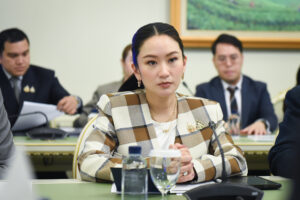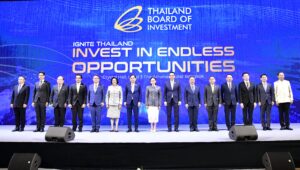คำแถลงพรรคเพื่อไทย เรื่อง โครงการรับจำนำข้าว
คำแถลงพรรคเพื่อไทย
เรื่อง
โครงการรับจำนำข้าว
เนื่องจากมีความพยายามที่จะเรียกร้องในทางแพ่งในโครงการรับจำนำข้าวต่อ
นางสาวยิ่งลักษณ์ ชินวัตร อดีตนายกรัฐมนตรี ก่อให้เกิดกระแสวิพากษ์วิจารณ์อย่างกว้างขวางในสังคม
ถึงความโปร่งใสและความยุติธรรม หลายฝ่ายต่างรู้สึกว่าการดำเนินการครั้งนี้ มีความพยายามสร้างวาทกรรมทางการเมือง
ก่อให้เกิดความเข้าใจที่คลาดเคลื่อนกับความเป็นจริง
อันจะมีผลต่อการอำนวยความยุติธรรมให้แก่อดีตนายกรัฐมนตรียิ่งลักษณ์ ชินวัตร
พรรคเพื่อไทยในฐานะพรรคการเมืองที่เป็นผู้มีส่วนสำคัญในการนำเสนอนโยบายดังกล่าว
ในการเลือกตั้งทั่วไปเมื่อปี พ.ศ.2554 จนได้รับการสนับสนุนอย่างท่วมท้น
ได้รับเสียงข้างมากในรัฐสภา
ในฐานะที่พรรคเพื่อไทย
เป็นผู้นำเอาเจตนารมณ์และความต้องการของพี่น้องประชาชนโดยเฉพาะเกษตรกร ชาวไร่ชาวนา
นำโครงการรับจำนำข้าวอันเป็นหนึ่งโครงการสำคัญบรรจุเป็นนโยบายของรัฐบาล ได้แถลงเป็นสัญญาประชาคมต่อรัฐสภา
และเริ่มผลักดันให้โครงการดังกล่าวดำเนินการมาอย่างต่อเนื่องเพื่อประโยชน์แก่พี่น้องเกษตรกรทุกท่าน
พรรคเพื่อไทยจึงขอถือโอกาสนี้ชี้แจงข้อเท็จจริงต่างๆ
ของโครงการรับจำนำข้าว ต่อพี่น้องประชาชนโดยสังเขป
ดังต่อไปนี้
1.
นโยบายจำนำข้าวเป็นแนวคิดของพรรคเพื่อไทย
ที่จะช่วยเหลือชาวนาให้ได้รับประโยชน์สูงสุด
เพื่อยกระดับรายได้และชีวิตความเป็นอยู่ของชาวนา จำนวนถึง 3.7
ล้านครัวเรือน คิดเป็น 23% ของประชากรไทยทั้งประเทศ
นโยบายจำนำข้าว
มิใช่นโยบายประชานิยมแบบให้เปล่า หากแต่เป็นหนึ่งในโครงการตามแนวนโยบายพื้นฐานแห่งรัฐ
ซึ่งถูกบัญญัติไว้ในมาตรา 84(8) ตามรัฐธรรมนูญแห่งราชอาณาจักรไทย
พ.ศ. 2550…” ให้รัฐทำหน้าที่คุ้มครองและรักษาผลประโยชน์สูงสุดของเกษตรกรในการผลิตและการตลาด
ตลอดจนส่งเสริมสินค้าเกษตรให้ได้รับผลตอบแทนสูงสุด”
2.
โครงการรับจำนำข้าวถือเป็นหนึ่งใน
“สัญญาประชาคม” ที่พรรคเพื่อไทยได้รับการยอมรับและสนับสนุนจากประชาชนทั่วประเทศในการเลือกตั้งทั่วไป
พ.ศ. 2554
และพรรคฯ ได้นำแนวนโยบายดังกล่าวบรรจุไว้เป็นนโยบายของรัฐบาลแถลงและได้รับความเห็นชอบจากรัฐสภา
ตามบทบัญญัติของรัฐธรรมนูญ
3.
โครงการสาธารณะต่างๆ ตามแนวนโยบายพื้นฐานแห่งรัฐและตามกรอบที่แถลงต่อรัฐสภา
ซึ่งกำหนดให้เป็นแนวนโยบายที่รัฐบาลใช้เป็นกรอบในการบริหารประเทศ ทุกประเทศทั่วโลกล้วนถือเป็นค่าใช้จ่ายที่จำเป็นเพื่อดำเนินการในการแก้ไขปัญหาของประเทศและประชาชนโดยรวม
แนวนโยบายที่เอื้อต่อการกระตุ้นเศรษฐกิจเพื่อคุณภาพชีวิตของเกษตรกร
คือการลงทุนในมิติทางสังคมต่อประชากรของประเทศ จึงไม่มีประเทศใดในโลกนำโครงการเหล่านี้มาพิจารณาในเรื่องกำไร-ขาดทุน
ดังเช่น พระราชกฤษฎีกาว่าด้วยหลักเกณฑ์และวิธีการบริหารกิจการบ้านเมืองที่ดี
พ.ศ.2546 ซึ่งกำหนดว่า…”การประเมินโครงการประเภทนี้ให้คำนึงถึงประโยชน์โดยรวมทางด้านเศรษฐกิจ
สังคมและอื่นๆ ที่มีต่อประเทศชาติและประชาชนโดยรวม มิใช่ประเมินจากผลกำไร-ขาดทุน”
โครงการรับจำนำข้าวจึงถือเป็นนโยบายที่ต้องการช่วยเหลือเกษตรกรเช่นเดียวกับโครงการสาธารณะอื่นๆ
ที่ได้จัดสรรงบประมาณเพื่อให้การช่วยเหลือประชาชนกลุ่มต่างๆ
ตามสิทธิเชิงสวัสดิการที่พลเมืองของประเทศพึงได้รับ มิเช่นนั้นโครงการต่างๆ ในอดีต
เช่น โครงการสาธารณูปโภคพื้นฐาน การจัดสวัสดิการให้แก่เด็กผู้สูงอายุ ผู้ยากไร้ คนพิการ
การจัดโครงการสุขภาพถ้วนหน้า โครงการ ปรส. โครงการเช็คช่วยชาติ โครงการประกันราคาข้าว
โครงการช่วยเหลือปัจจัยการผลิตและประกันราคายางพารา แม้กระทั่งการช่วยเหลือชาวนาแบบให้เปล่าไร่ละ
1,000
บาทต่อฤดูกาล
ล้วนเป็นโครงการที่รัฐใช้เงินจำนวนมากมหาศาลเข้ามาคุ้มครองดูแลประชาชนของตนทั้งสิ้น
หากพิจารณาในมิติเศรษฐกิจเชิงพาณิชย์ด้านเดียว
โครงการสาธารณะเหล่านี้ล้วนต้องถูกตีความว่าขาดทุนและทำให้ประเทศชาติเสียหายทั้งสิ้น
ซึ่งก็จะส่งผลให้รัฐบาลและผู้รับผิดชอบต้องถูกดำเนินคดีเช่นกัน
4.
โครงการรับจำนำข้าวที่รัฐบาลพรรคเพื่อไทยริเริ่มและผลักดันให้เกิดขึ้น
ได้มีการจ่ายเงินให้ชาวนา 870,018 ล้านบาท ส่งผลให้เศรษฐกิจเกิดการหมุนเวียนอีกหลายรอบ
ซึ่งนับเป็นผลดีอย่างยิ่งต่อการพัฒนาเศรษฐกิจโดยรวมของประเทศ
นอกจากนั้นรัฐบาลยังสามารถเก็บภาษีได้เพิ่มขึ้นถึงปีละกว่า 1 แสนล้านบาท รัฐบาลมีมาตรการป้องกันการทุจริต โดยจ่ายเงินผ่านตรงเข้าบัญชีชาวนา
เงินทุกบาททุกสตางค์ล้วนถึงมือชาวนาโดยไม่มีการรั่วไหล หรือใครได้รับผลประโยชน์จากเงินดังกล่าว
นอกจากนี้โครงการรับจำนำข้าว
ยังมีข้าวที่ชาวนานำมาจำนำอันถือเป็นสมบัติของรัฐบาลและประเทศ ซึ่งเก็บไว้ในสต็อค
ที่ผ่านมาในช่วงที่แห้งแล้งและปลูกข้าวไม่ได้ ยังสามารถนำข้าวดังกล่าวไปขายในตลาดโลก
ทำให้รัฐบาลมีรายได้มากขึ้นจากการเป็นผู้ส่งออกข้าวในอันดับสูงต้นๆ ของโลก
5.
การกล่าวหาอดีตนายกรัฐมนตรีที่เป็นผู้ควบคุมและกำกับนโยบายรับจำนำข้าว
ว่าละเลยปล่อยให้มีการทุจริตเสียหายอย่างร้ายแรง ไม่มีการแก้ไขตรวจสอบหรือยกเลิกโครงการ
ถือเป็นข้อกล่าวหาที่ไม่ยุติธรรม และไม่ถูกต้องตรงกับความเป็นจริง
รัฐบาลของพรรคเพื่อไทยได้ดำเนินโครงการรับจำนำข้าวโดยใช้ความระมัดระวังอย่างรอบคอบ
มิได้ปล่อยปละละเลยให้เกิดความเสียหาย
โดยได้มีการสั่งการและกำหนดให้มีมาตรการป้องกันและปราบปรามการทุจริตอย่างชัดเจนหลายมาตรการ
ซึ่งมาตรการเหล่านั้นได้ถูกสั่งการให้จัดทำขึ้นอย่างเข้มงวด โดยการพัฒนาปรับปรุงจากหลักเกณฑ์และวิธีการต่างๆ
เท่าที่รัฐบาลในอดีตเคยดำเนินการและจัดทำกันมากว่า 30 ปี
ขณะเดียวกัน จากรายงานการไต่สวนของ
ป.ป.ช. ได้เคยมีบันทึกยืนยันว่า…”ไม่ปรากฏหลักฐานว่า อดีตนายกรัฐมนตรียิ่งลักษณ์
ชินวัตร มีส่วนร่วมในการทุจริต หรือสมยอมให้เกิดการทุจริต
การประโคมข่าวเรื่องการทุจริตหรือการปล่อยปละละเลยให้มีการทุจริต
จึงเป็นเพียงกลวิธี หรือวาทกรรมที่ต้องการสร้างกระแสความชอบธรรมทางการเมือง เพื่อทำลายและปรักปรำอดีตนายกรัฐมนตรียิ่งลักษณ์
ชินวัตร อย่างเลวร้ายและไม่ยุติธรรมอย่างยิ่ง
โดยเฉพาะอย่างยิ่ง
วิธีการที่ไม่ชอบธรรมที่สุด คือ
ความพยายามสร้างเงื่อนไขและผลักดันให้อดีตนายกรัฐมนตรียิ่งลักษณ์ ชินวัตร
ต้องรับผิดชอบต่อค่าใช้จ่ายหลายแสนล้านบาทในโครงการรับจำนำข้าว ทั้งๆ ที่คดีความดังกล่าวยังมีปัญหาเรื่องการตีความ
“ความเสียหาย” ที่ยังถกเถียงโดยยังไม่มีข้อยุติ
และคดีความดังกล่าวยังเพิ่งเริ่มต้นในศาลอาญาแผนกคดีการเมือง
และเพิ่งอยู่ในขั้นตอนเริ่มแรกของการตกลงเรื่องพยานหลักฐาน
โดยยังไม่ได้เข้าสู่ขั้นตอนการพิจารณาคดีเลย
นอกจากนั้นยังมีข้อโต้แย้งกันอยู่ว่า
ป.ป.ช.จะสามารถระงับยับยั้งโครงการที่รัฐบาลแถลงต่อรัฐสภาได้หรือไม่
และหากมีการระงับยับยั้งหรือยุติการดำเนินงาน รัฐบาลจะถูกกล่าวหาว่า
กระทำการขัดต่อรัฐธรรมนูญหรือไม่?
6.
เป็นที่ทราบกันดีว่า ขณะนี้ได้มีการฟ้องอดีตนายกรัฐมนตรีต่อศาลฎีกาแผนกคดีอาญาของนักการเมือง
ข้อเท็จจริงคือคดียังอยู่ในชั้นตรวจสอบพยานหลักฐาน ยังไม่ได้เริ่มต้นสืบพยานเลยแม้แต่น้อย
แต่กลับเร่งรัดหาทางในการดำเนินคดีแพ่ง เพื่อชี้ให้อดีตนายกรัฐมนตรีต้องรับผิดในทางแพ่ง
ความจริงควรมีการพิจารณาบรรทัดฐานที่เกิดขึ้นในอดีตว่า
โครงการที่นายกรัฐมนตรีหรือคณะรัฐมนตรีได้ทำตามนโยบายที่แถลงต่อรัฐสภา
ไม่เคยปรากฏว่ามีการนำมาฟ้องร้องกันไม่ว่าในทางอาญาหรือทางแพ่ง
ในยุคที่ประเทศไทยเรียกร้องให้มีการปฏิรูปโดยเฉพาะอย่างยิ่งในเรื่องความเป็นธรรม
ปัญหาในเรื่องสองมาตรฐานหรือการเลือกปฏิบัติก็ไม่ควรจะเกิดขึ้น
แต่ข้อเท็จจริงที่ปรากฏในขณะนี้จะเห็นได้ว่า
มีการใช้กลไกและเทคนิคทางกฎหมายทุกรูปแบบเพื่อหวังผลทางการเมืองให้เกิดกับอดีตนายกรัฐมนตรีและผู้เกี่ยวข้อง
การเร่งรัดเพื่อเรียกค่าเสียหายทางแพ่งในโครงการรับจำนำข้าวนั้น
มีลักษณะเร่งรัดอย่างผิดปกติ ทั้งที่องค์ประกอบทางกฎหมายในการเรียกค่าเสียหายก็ยังไม่ชัดเจนว่าจะทำได้หรือไม่
สถานการณ์ดังกล่าว
พรรคเพื่อไทยจึงขอชี้แจงให้ประชาชนและสาธารณชนทั่วไป ได้มีส่วนร่วมในการพิจารณาเหตุผลและข้อเท็จจริงดังกล่าว
เพื่อคืนความยุติธรรมให้แก่อดีตนายกรัฐมนตรียิ่งลักษณ์ ชินวัตรและผู้เกี่ยวข้องทุกท่าน
พรรคเพื่อไทย
22 ตุลาคม 2558
Pheu
Thai Party Statement
On
Rice Pledge Policy
Recently,
the lawsuit and civil claim on Rice Pledge Program against Miss
YingluckShinawatra has raised widespread controversial issues on transparency
and justice in our society. Political propagandas were created and facts were
distorted. These factors could affect and mislead the ex-premier’s case.
Pheu Thai Party is the
political party who proposed this policy to the people and won a landslide
victory in the 2012 general election.Therefore, when Pheu Thai Party became the
government, the policy was declared to the parliament as the state policy. The
Policy then became legal obligation to the country and people especially to the
fellow farmers which the government must executeas an “act of government” as promised
Pheu Thai Party is
making these statements to clarify facts regarding the Rice Pledge Policy to
the fellow Thais as follows:
1. Rice Pledge Policy
was designed to enhance the purchasing powers and welfare of the Thai farmers
which are as many as 3.7 million households or an approximate of 23% of total
population of Thailand.
Rice
Pledge Policy is not a populist policy which give away government budget for
free butthe Directive
Principles of Fundamental State Policies stated in 2007 constitution section 84
(8) that “the government shall protect and preserve the farmers’ best interests
in production and marketing as well asagricultural product prices to earn the
highest yield.”
2. Rice Pledge
Policy is considered “a public promise” Pheu Thai Party committed to the
people. Our Party was elected for such policy by the majority vote of the
people through the 2012 general election. After the election, the government
led by Pheu Thai Party then declared the Rice Pledge Policy to the parliament
as the state policy which was approved by the parliament.
3. According to the
Directive Principles of Fundamental State Policies, public policies are
framework for the government to spend national budget to resolve the country
and its people’s social and economic issues. These budgets are used as means to
stimulate national economy and to enhance the welfare of the farmers. No
country in the world would calculate profit and loss on policies meant for
enhancing public welfare as stated in the 2003 Good Governance Act that “to
evaluate public policy, the government must consider an overall aspects of
economic, social and other benefits to the country and its people, not the
profit and loss of the policy.”
The Rice Pledge
Policy is a public welfare aimed to enhances the welfare of the farmers in the
same manner as other public policies for other groups of population in the past
like public infrastructure, public welfares for children,senior
citizens, the poor, the disable as well as Financial
Sector Restructuring Authority, “Help the Nation”
Cheque, Rice Price Guarantee, Rubber Price Guarantee, and 1,000 Baht per Rai
per Crop Season for Farmers. These policies all required great amount of
national budget to resolve people’s issue.
If consider these
policies in one single profit and loss aspect, public policies are deemed to
cause our nation damages which governments in the past must be held accountable
for civil charge as well.
4. The government led
by Pheu Thai Party has implemented the Rice Pledge Policy by subsidizing the
rice price and transferring all 870,018 Million Baht directly to the farmers.
This in turn had increased the farmers’ purchasing power thus stimulated the
economy. As a result, the government was able to collect additional tax for
more than 1 trillion Baht per year. The government had also prevented
corruption by transferring every single Baht directly to the farmers. No one
but the farmers benefits from the policy.
Through the Rice Pledge
Policy the government also had rice stock as national asset. When Thailand
experienced drought causing low rice production, Thailand still has rice stock
to sell in the world market. Thai government could earn income from rice export
as one of the top exporters in the world rice market.
5. The corruption
charge and lawsuit against the ex-premier as the Chairperson of Thai National
Rice Policy which accused Miss Yingluck that she has omitted her duty to allow
corruption and damages is unjust and untrue.
The government led by
Pheu Thai Party had implemented the Rice Pledge Policy carefully by
establishing clear corruption prevention procedure. The procedure was strictly
enforced. The government had also developed the corruption prevention procedure
by avoiding mistakes from previous governments which also implemented the Rice
Pledge Policy for more than 30 years.
Simultaneously,
the NACC investigation report has also stated “no evidence was present to prove
that ex-Premier YingluckShinawatra was a part of corruption or partly allowed
the corruption to happen.”
Manycomments made
public through the media are merely political propaganda to legitimately accuse
Miss Yingluck. Such behaviors are unacceptable and unjust.
The news scandals
against Miss Yingluck thus are propaganda and false accusation.
The most unjust
behavior is an attempt to charge a civil claim of trillion Baht to for the Rice
Pledge Policy by evaluating “damages” when the criminal case is still ongoing.
The court has only just begun to consider the witness lists, not even on trial.
Moreover, the most
controversial issue for this case is whether NACC has an authority to terminate
“state policy”. And if the policy was terminated, would the government be
charged of unlawful act against the constitutional laws?
6. While the criminal
case in division of politicians is still on trial, the government has already
accelerated the civil charge against the ex-premier. In reality, no Prime
Minister nor any cabinet members had ever been charged a criminal or civil
case. This fact should be considered as legal standards. Moreover, during the
current period of national reform, double standards or selective laws
enforcement should not happen in Thailand. Nevertheless, an abuse of laws are
clearly politically driven. Charges against the former Prime Minister and
cabinet members are abnormally accelerated when the cases are yet inconclusive.
Given
these situations, Pheu Thai Party is writing this public statement to call on
people’s consideration of these facts and call for justice to former Prime
Minister YingluckShinawatra and all related persons.
Pheu
Thai Party
22
October 2015







